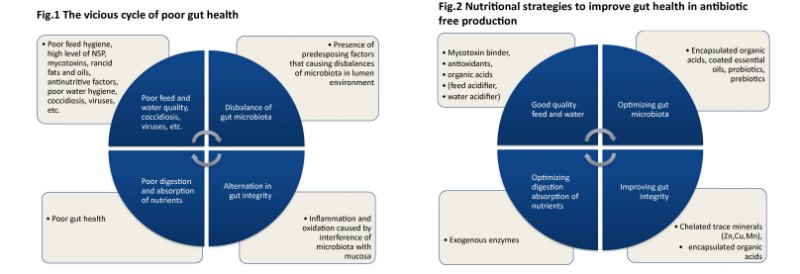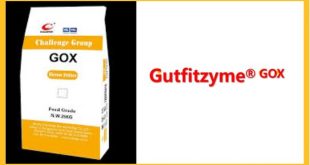 Dr. Anjan Mondal : A healthy chicken gut is essential for optimum digestibility, maximum nutrient absorption, immunity development and disease resistance. Disruption of gut integrity and imbalance of gut microbiota may have negative effects on feed conversion, productivity, and health of chicken.
Dr. Anjan Mondal : A healthy chicken gut is essential for optimum digestibility, maximum nutrient absorption, immunity development and disease resistance. Disruption of gut integrity and imbalance of gut microbiota may have negative effects on feed conversion, productivity, and health of chicken.
For the last few decades in poultry production, antibiotic growth promoters (AGPs) have been widely used in poultry diets to promote growth, improve feed efficiency and control dysbacteriosis and enteric diseases. Unfortunately, the extensive use of antibiotic growth promoters at subtherapeutic doses in poultry diets has the possibility to generate antibiotic resistant pathogens in animal products. Antibiotic-free poultry production is a common trend worldwide because the use of antibiotics has been banned by governments in many countries and due to increasing concerns about antibiotic resistance. These circumstances have ensured a search for alternative strategies to modulate gut development and health in poultry.
Strategies to modulate gut health in antibiotic-free poultry production Feed quality
- Optimum nutrient digestion and absorption depends on high quality feed ingredients.
- Feed particle size is very important for gizzard development. A well-developed gizzard is essential to enhance grinding activity, leading to not only increased gut motility and greater digestion of nutrients, but also to greater reduction in particle size entering the small intestine, ultimately increasing the accessibility of the feed to digestive enzymes. Poor pellet quality and excess fine particles can reduce gizzard function which can increase the incidence of feed passage (undigested feed in the animal’s waste) and dysbacteriosis or microbial imbalance.
- High levels of antinutritional factors in the feed could lead to poor digestibility, resulting in more undigested protein in the intestinal lumen. The presence of undigested protein in the lumen favors the proliferation of pathogenic bacteria, such as Clostridium perfringens. Supplementing the diet with good quality exogenous protease enzyme has been shown to considerably improve protein digestibility.
- High concentrations of trypsin inhibitors in diets have a negative effect on nutrient digestibility and gut health. Trypsin inhibitors are directly correlated with rapid feed passage and dysbacteriosis. Thermal processing of soybean meal is critical because negative effects from undercooked and overcooked soybean meal on digestion have been cited. Undercooked soybean meal has higher concentrations of trypsin inhibitors whereas overcooking decreases digestibility of the proteins. Inclusion of a good quality protease in the diet can reduce the impact of trypsin inhibitors on digestion.
- Coarser particle size of soybean meal, close to 700-900 µm, favors higher digestion of soybean protein and minimizes the negative effects of antitrypsin factors.
- A high content of soluble non-starch polysaccharides (NSPs) in the feed can increase viscosity in the gut, decreasing the passage rate of feed in the stomach (digesta). This leads to decreased absorption of digesta and increased incidence of wet droppings. The addition of an exogenous NSP enzyme in feed can considerably decrease NSP levels and reduce the risk of bacterial enteritis.
- Mycotoxins can alter the normal gut functions, such as barrier function and nutrient absorption. Where feed storage is concerned, control measures need to be implemented to minimize grain damage and conditions that could increase mold and insect spoilage. Adding a broad-spectrum mycotoxin binder to the diet can reduce the adverse effect of mycotoxins on poultry health.
- Rancid oils and fats should be rejected since they have been shown as a path to enteric diseases. Proper storage conditions in tanks and transportation lines should be evaluated frequently to control rancidity development within the feed mill. Additionally, the use of antioxidants in feed can reduce oxidation and thereby reduce rancidity.
Certain feed ingredients and additives have been shown to modulate gut microbiota and the immune system in poultry. Those dietary factors should be considered when formulating broiler diets (Figs 1&2). Several classes of feed additives have been proposed and evaluated in poultry preproduction, including organic acids, essential oils, probiotics, prebiotics, enzymes, and trace minerals. These feed supplements are used as an alternative to antibiotic growth promoters to modulate gut microbiota and enhance gut integrity for better growth, feed efficiency and improved bird health (Fig 2).
Water quality
Water is the most important nutrient for poultry and is involved in every physiological process of a bird. Water is also a medium that can transport bacterial, viral and protozoan infections in poultry houses. Unfortunately, the importance of water quality is usually overlooked. Water quality is essential for proper digestion, so its physicochemical characteristics should be measured, controlled and improved on the farm.
The water’s pH is an important factor that can influence microbial populations in water and in the animal’s gut, thus maintaining microbiota balance in the lumen environment. The ideal water pH for poultry should be between 5 and 7, because alkaline pH (that above 7) is shown to reduce the activity of digestive enzymes. Studies show that birds can tolerate a low pH of 3.5. Drinking water with carbonates and other salts that increase the alkalinity and hardness can cause problems. Hardness and alkaline pH of water create an environment for biofilm and endotoxins to thrive in the water tank, pipeline, and drinker due to the proliferation of algae and microbes.
Conclusion
To better optimize poultry digestibility and performance in antibiotic-free production, there is a need to develop cost effective alternative strategies that manipulate gut microbiota. Several feed additives including organic acids, essential oils, probiotics, prebiotics, exogenous enzymes, and trace minerals have been successfully used for better gut health and efficient production performance in poultry. Combinations of these various alternatives with proper farm management and biosecurity measures are the key to maximizing poultry performance in this antibiotic free era.
Author: Senior Technical Manager, Novus International, Inc.
References available upon request.
This article has been originally published by FeedNavigator.com, for more details contact : reena.rani@novusint.com
 Agrinews24 কৃষির সাথে, কৃষকের পাশে
Agrinews24 কৃষির সাথে, কৃষকের পাশে





















